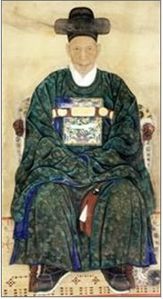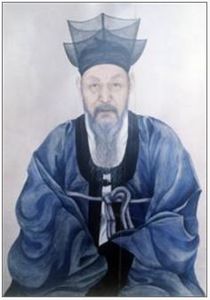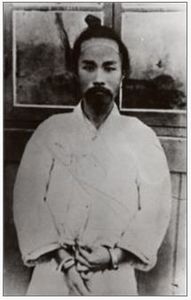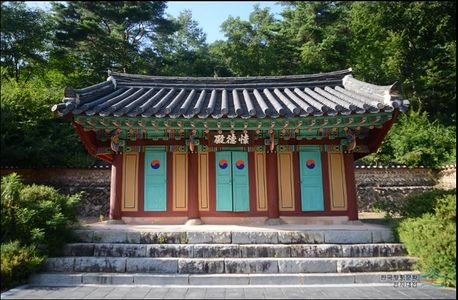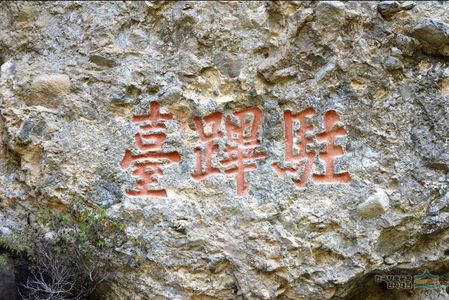이산묘
| Isanmyo Shrine | |
|---|---|
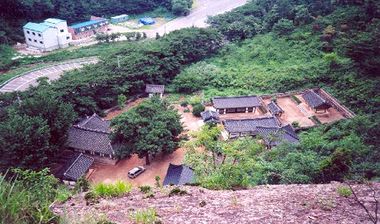
| |
| 지정 정보 Designation Information | |
| 번호 Number | 전라북도 기념물 제120호 |
| 지정일 Date | 2004년 7월 30일 |
| 명칭 Name | |
| 국문 Korean | 이산묘 |
| 한자 Chinese | 駬山廟 |
| 영문 English | Isanmyo Shrine |
| 세부 정보 Details | |
| 분류 Type | 사당 / |
| 건립·제작 Creation | 일제시대 / 20 세기 / 1925년 |
| 위치 및 연락처 Location & Contact | |
| 소유자 Owner | 이산묘봉찬회 |
| 관리자 Manager | N/A |
| 연락처 Contact | N/A |
| 주소 Address | 전라북도 진안군 마령면 마이산남로 132 |
| 위도 Latitude | 35.753792 |
| 경도 Longitude | 127.396575 |
| 웹사이트 Website | 링크 Link |
해설문 Interpretive Text
| 국문 Korean | 영문 English |
|---|---|
| 이산묘는 조선 건국의 정신과 구한말 구국항쟁의 뜻을 기리는 사당이다.
지역과 전국의 유림이 일제에 국권을 빼앗긴 울분으로 스스로 목숨을 끊은 순국지사 송병선 선생과 의병장 최익현 선생의 애국충정을 이으려고, 1925년 건립한 이산정사(駬山精舍)가 이산묘 이름의 기원이다. 해방 후 1946년 회덕전(懷德殿)을 건립한 데 이어 영모사(永慕祠)와 영광사(永光祠)를 완공해, 각각 단군·태조·세종·고종의 4성위와 조선 개국 이래의 충신과 유림 40위, 구한말 을사늑약 이후의 충신·열사 34위의 위패를 봉안하였다. 사당의 왼쪽 암벽에 주필대(駐蹕臺)라는 글자가 새겨져 있다. 주필대는 태조 이성계가 남원 운봉 황산대첩에서 왜구를 무찌르고 개선하던 중에 하늘로부터 금척(金尺)을 받은 것을 기념해 잠시 머물러 시를 읊은 곳으로 전한다. 주필대 암벽 윗부분에는 제사를 지내던 황단(皇壇) 터가 자리하는데, 이곳은 1907년 의병장 이석용을 비롯한 의병들이 국권 수호와 조직적인 항일운동을 위해 결성한 호남의병창의동맹단의 집결지이다. |
Isanmyo is a shrine honoring the founding spirit of the Joseon Dynasty (1392-1910) and the struggles of saving the country at the end of the dynasty.
It was first established as Isanjeongsa Shrine in 1925 by Confucian scholars in order to commemorate Song Byeong-seon, a national patriot, and Choe Ik-hyeon, a leader of the civilian army in the late Joseon period. The shrine was destroyed by the Japanese during the colonial period, but after the liberation of Korea in 1945, it was restored by the construction of Hoedeokjeon Hall and Yeongmosa and Yeonggwangsa Shrines. Currently, the shrine houses memorial tablets of four national sages (Dangun, King Taejo, King Sejong, and King Gojong), 40 loyal subjects and Confucian scholars of the Joseon period, as well as 34 patriots of the Japanese colonial period. Next to the shrine, there is a rocky cliff with an inscription meaning “the place of a king’s stay.” This cliff is known to be the place where King Taejo took a rest on the way to the capital after defeating Japanese pirates in Namwon. Above the cliff, at the former site of an altar of heaven, the civilian army of Jeolla-do Province assembled in opposition to Japanese imperialism in 1907. |
관련 항목 Related Entries
| 본 기사 Current Entry | 관계 Relation | 관련 기사 Related Entry |
|---|---|---|
| 이산묘 | ||
갤러리 Gallery
- 이산묘
